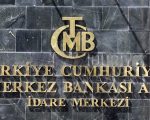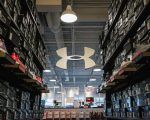
KitKat chocolate bars, manufactured by Nestle SA, arranged in London, U.K., on Monday, July 26, 2021. Nestle report their half-year results on July 29. Photographer: Hollie Adams/Bloomberg via Getty Images
Bloomberg | Bloomberg | Getty Images
Nestle posted lower-than-expected nine-month sales growth on Thursday as higher product prices made shoppers balk, sending shares down about 2% in morning trade, but said it expects volumes to turn positive again by the end of the year.
The packaged goods industry has for over two years hit shoppers with higher prices, citing higher input costs that started with the COVID-19 pandemic and were exacerbated by Russia’s invasion of Ukraine. Everything from sunflower oil to freight has become more expensive, taking a toll on global supply chains.
Nestle’s 8.4% price increase was below the average analyst estimate of 8.6%. Real internal growth (RIG) – or a measure of sales volumes – fell 0.6%, meeting expectations. In the third quarter, RIG improved to a decline of 0.3%, Nestle said.
The company’s CEO, Mark Schneider, said he had “confidence that real internal growth, the sum of volume and mix, will turn positive in the second half of the year and again become the main driver of growth going forward.”
“Pricing will be more targeted, by brand and by country,” Schneider said.
P&G, which makes Tide detergent and Gillette razors, on Wednesday reported weak sales volumes, but said this was stabilising and would start to pick up through the rest of the year.
“The (Nestle) results were slightly underwhelming. The market was expecting more on volumes,” Aviva portfolio manager Richard Saldanha said. “The ultimate catalyst for the stock’s multiple to improve is going to be seeing that volume number going positive.”
“Pricing has moderated so we should see some sign of volume improvement soon…there are clearly some categories that remain quite challenged like water and health sciences.”
Investors and analysts have raised concerns that companies are pushing price rises too far and recommended that they focus more on marketing and innovation, amid a cost of living crisis that is seeing retailers’ private label brands stealing market share.
Organic sales, which exclude the impact of currency movement and acquisitions, rose 7.8% in the nine months ended September, the maker of Maggi stock cubes and Nescafe coffee said.
Analysts had on average expected organic sales growth of 8.1%.
Executives have in recent quarters flagged that costs are rising at a slower pace, but also warned that shoppers would continue to pay more for products like soap, toilet paper and coffee because companies still have not recouped years of damage from higher expenses.
Nestle confirmed its full-year outlook of organic sales growth between 7% and 8% and underlying trading operating profit margin between 17.0% and 17.5%.
A Nestle spokesperson said the firm had “not seen any impact from (weight loss drugs) on our sales”, referring to the potential threat posed to the packaged food industry by Novo Nordisk’s blockbuster weight-loss drug Wegovy.
The drug’s popularity has prompted concerns in the consumer and retail industry over whether food sales will be impacted. Nestle shares fell this month after Walmart, the world’s biggest retailer, said that it saw a slight pullback in food consumption with people taking appetite-suppressing drugs like Wegovy.








